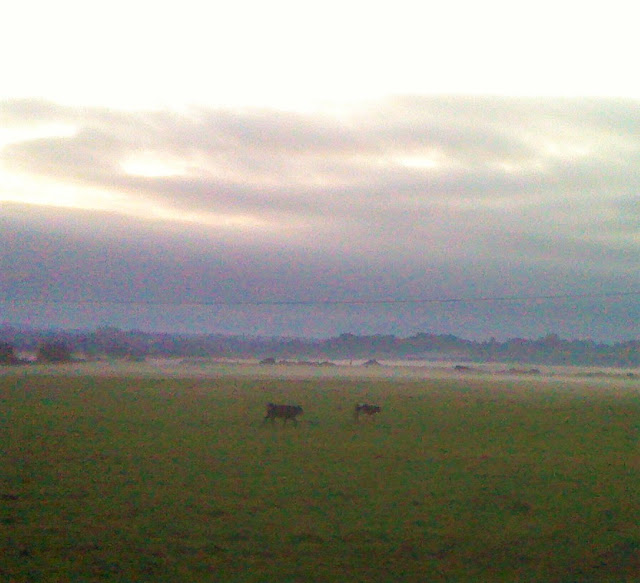We had a great Christmas; The
Girl got a new bow and arrows, to keep up with the passion that occupies most
of her free time. She’s been going to archery events across Ireland -- and
soon, in other countries -- and coming home with trophies, so I’m satisfied to
shell out the money to keep her going. She got me a book that she knew I’d
love, and we also got some Hitchcock DVDs -- we watched Rope the other night, and
as jaded a 21st century teenager as she is these days, afterwards
she said, “That was intense!”
This is always a difficult time
of year; the heating never works as well as it should, so we’re relying on the
fireplace to keep the house warm. Of course it got colder in parts of the USA
where I lived, but somehow it feels colder here; perhaps it’s the fact that it’s
damp, or that we live in the giant heat sink of the bog.
Also, as I’ve mentioned, we’re at
the same latitude as Alaska, so the winter nights are long and dark. I don’t
leave the house unless I have to, and have spent most of the time curled by the
fire writing what I hope will be a book.
Still, my elderly neighbours are
hardier than I, and grew up in this area before it had electricity, much less
under-floor heating. After Mass today I saw my neighbour Liam, haler at 75 than
I am now, and he exclaimed, “’Tis a fine frosty morning, isn’t it Brian?”
“’Tis lovely,” I said, “But I’m not
suited to it - I’ve spent a lot of time by the fire.”
“I just lit my first fire this
morning,” he said.
We talked some more, and I
promised I’d stop by for tea, thinking to myself, Remember to bundle up before
you go.
***
I went back to my usual schedule
this week, returning to my day job in Dublin. Every morning I wait in the
darkness for the double-decker bus to come barrelling down the country roads,
and stop and pick us up. Also returning to work were my neighbours; Cahil, who
works at the hardware store down the road; Sean, a local handyman and
construction worker; Betty and her grand-daughters.
Me: How was your Christmas
dinner?
Betty: Sure it was lovely, Brian;
now that I have daughters to do my cooking, so suddenly I enjoy Christmas
dinner a lot more than I used to.
Me: Seeing your children to
adulthood should have some rewards. Speaking of, I see your grandchildren
around, Lauren and Shannon. I can't tell them apart, but then they're usually
well bundled this time of year.
Betty: Ah, go on - they
could be in beach clothes and still look the same, sure they could.
Me: Does
everyone in your family look alike?
Betty:
Not too different -- I have four daughters and six grand-daughters, and none of
the apples fell far from the tree.
Me: In
appearance or where they live?
Betty: Aw
sure, two live in our village, and two in the next village down. Not a one that
can't bicycle to the others' house.
Me:
That's great -- and they all get along?
Betty:
Completely -- my youngest granddaughter is still in the school here, Rosin.
Me: I
know Rosin! If you don't mind my asking, is Martina -- the woman who works at
the shop in the village -- her other grandmother?
Betty:
(laughs) yes, her son married one of my daughters. We're co-grandmothers.
I suppose
it was not too unusual here, but would be most places -- every morning Betty
and I wait by the bus stop, while across the road in the village shop she sees
her grandchild's other grandmother in the window.
Me: Is
Rosin in secondary school yet?
Betty:
No, she's a year behind yours, but will be going to the same school later this
year. How's your little one finding secondary school?
Me: She's
not so little anymore -- we used to do things together all the time, but now
she wants to do her own thing. She spends a lot of time doing archery and
choir, and I don't mind -- kids can get into a lot worse these days.
Betty:
Sure, we all do that for a while. In the end, though, we come back home to our
family.
Me: I’ll
be counting the days.





